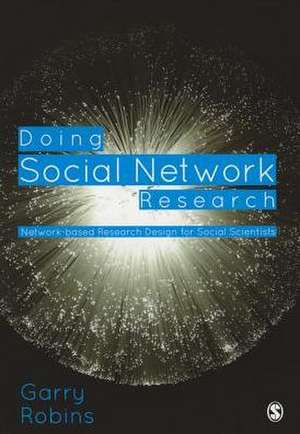Doing Social Network Research: Network-based Research Design for Social Scientists
Autor Garry L. Robinsen Limba Engleză Paperback – 15 ian 2015
If so, this is the book for you! With straight-forward guidance on research design and data collection, as well as social network analysis, this book takes you start to finish through the whole process of doing network research. Open the book and you'll find practical, 'how to' advice and worked examples relevant to PhD students and researchers from across the social and behavioural sciences.
The book covers:
- Fundamental network concepts and theories
- Research questions and study design
- Social systems and data structures
- Network observation and measurement
- Methods for data collection
- Ethical issues for social network research
- Network visualization
- Methods for social network analysis
- Drawing conclusions from social network results
Preț: 376.37 lei
Nou
72.02€ • 75.19$ • 59.60£
Carte disponibilă
Livrare economică 15-29 martie
Livrare express 01-07 martie pentru 35.18 lei
Specificații
ISBN-10: 1446276139
Pagini: 280
Dimensiuni: 170 x 242 x 15 mm
Greutate: 0.45 kg
Ediția:1
Editura: SAGE Publications
Colecția Sage Publications Ltd
Locul publicării:London, United Kingdom
Recenzii
This is a terrific book. It has a unique focus on social network research design, the critical interface between conceptual thinking and empirical research. It also has a wealth of detailed guidance on how to do network research, covering problem formulation, data collection, and data analysis, and is supported by interesting, diverse and appropriate examples.
Robins has provided a comprehensive exposition of social network research that teems with insights which seamlessly alternate between theory and real-world, practical examples. This book is a “must read” for anyone interested in conducting social network research and a “must have” for scholars who want to understand the distinctiveness of network research. Robins’ thoughtful approach to network research will help improve the quality of future scientific investigations into the causes and consequences of social network processes across a wide range of applications.
I have been waiting a long time for a book that educates researchers on how to design network studies and how to gather network data, paying less attention to the methodology necessary to do the analysis. The book is finally here. Visualization, design, measurement, data structures, dealing with subjects — these are the topics here, topics that are usually given none or very little attention in standard network methodology books. It will be the first book mentioned on my network analysis course syllabi. And it should be on every network researcher’s bookshelf. Such a text has been a long time coming. And I am very glad it is now here. It does indeed pull back many curtains of the secret world of network science. Professor Robins is a wizard!
Two categories of readers will find this book particularly interesting. First, those considering an investigation in connection with networks. They will find both a recent presentation of the area and support at each milestone to select the appropriate tools and literature. On the other hand, those who are interested to locate the specifics - both methodological and conceptual - of a research area that has undergone significant changes in recent years.
The strong point of Robins' work is above all to succeed in articulating analysis of networks and other theories from the social sciences, while referring to concrete and recent research. The book regularly takes the view of a "thoroughbred" network analyst and tries to encourage the reader to think "networks". If the book is aimed primarily at a novice researcher in network analysis, the sharpness of the last chapters will also appeal to the more experienced researcher. Written in a fluid style and rather straightforward, the book contrasts with the more neutral tone usually adopted in textbooks. In addition to the quality of the didactic system available to the reader (glossaries, examples, summaries and recommended readings at the end of the chapter)
Cuprins
The difference with social networks research
Fundamental network concepts and ideas
Thinking about networks: Research questions and study design
Social systems and data structures: relational ties and actor attributes
Network observation and measurement
The empirical context of network data collection
Ethical issues for social networks research
Network visualization: What it can and cannot do
A review of social network analytic methods
Drawing conclusions: Inference, generalization, causality and other weighty matters
Descriere
Are you struggling to design your social network research? Are you looking for a book that covers more than social network analysis?
If so, this is the book for you! With straight-forward guidance on research design and data collection, as well as social network analysis, this book takes you start to finish through the whole process of doing network research. Open the book and you'll find practical, 'how to' advice and worked examples relevant to PhD students and researchers from across the social and behavioural sciences.
The book covers:
- Fundamental network concepts and theories
- Research questions and study design
- Social systems and data structures
- Network observation and measurement
- Methods for data collection
- Ethical issues for social network research
- Network visualization
- Methods for social network analysis
- Drawing conclusions from social network results
This is a perfect guide for all students and researchers looking to do empirical social network research.














